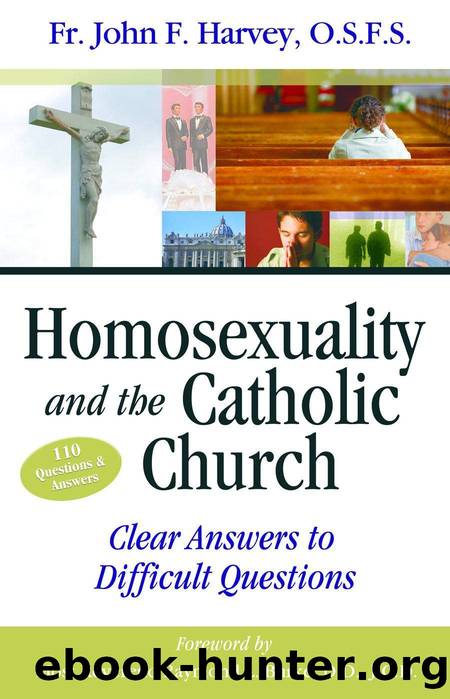Homosexuality & the Catholic Church by Harvey O.S.F.S. Fr. John F

Author:Harvey O.S.F.S., Fr. John F.
Language: eng
Format: epub
Published: 2013-04-02T00:00:00+00:00
Chapter 7
Freedom of the Will and Addiction
On this important topic, we will take St. Augustine as our guide. His writings on the nature of the will and addiction are considered by moral theologians to be among the most profound among Christian thinkers.
1. St. Augustine lived and wrote more than 1,500 years ago. Are his thoughts relevant for today?
St. Augustineâs experience of conversion and the struggles he went through to attain peace in his heart and mind are instructive for all, but especially for those who struggle with same-sex attraction. In order to understand the steps leading to his conversion, I think it will be helpful to examine first St. Augustineâs pre-conversion experiences as a Manichean.
The Manicheans held that there were two eternal principles or causes of all things, the principle of light (which was good) and the principle of darkness (which was evil). These two principles, thought to be eternal, were engaged in unceasing strife with each other. Both principles were considered to be material, and hence all things were composed of matter. Thus, evil was considered a material substance.1
Since Augustine believed that there were two material principles in conflict with one another, he also believed that there were two material wills in conflict within each individual. This led him to believe that the evil principle was responsible for his evil acts. Gradually, as he moved away from such Manichean beliefs, he began to understand the spirituality of the human will and the spiritual nature of the good God.2 But he still spoke of his âevil natureâ overcoming his better nature. This was willful blindness. He was afraid to admit to himself that he desired the pleasures of lustful behavior.
Augustine did not yet understand that God is pure spiritâand that evil is not a substance, but the privation (i.e., lack) of a substance. Being a Manichaean, he regarded evil as a physical entity; he could not understand how an all-good God could create evil. Only when he came to understand that evil was not a substance but merely a privation was he able to see clearly that the will of man was the cause of sin, and that God merely tolerates evil.
As he overcame his false beliefs, Augustine formulated an argument that manâs will is the cause of sin. God is incorruptible, inviolable, and immutable, but every creature is corruptible, violable, and mutable. Therefore, man as a creature can sin, and through habitual sin, subject himself to forces over which he has little or no control, such as an addiction.
In his Confessions, St. Augustine writes about how he came to realize this truth. During his Manichean darkness, he was accustomed to blaming the foreign substance within him for his sins, but as he drew closer to the truth, he saw that he alone was responsible for his deliberate actions. Finally, during a crisis he experienced just before his conversion, Augustine perceived that the Manichean doctrine of two wills, one good and one bad, fighting for supremacy within man, was unreasonable.
Download
This site does not store any files on its server. We only index and link to content provided by other sites. Please contact the content providers to delete copyright contents if any and email us, we'll remove relevant links or contents immediately.
The 5 Love Languages: The Secret to Love That Lasts by Gary Chapman(9784)
The Space Between by Michelle L. Teichman(6929)
Assassin’s Fate by Robin Hobb(6199)
Wiseguy by Nicholas Pileggi(5770)
Everything Happens for a Reason by Kate Bowler(4733)
Gerald's Game by Stephen King(4641)
Pillow Thoughts by Courtney Peppernell(4271)
A Simplified Life by Emily Ley(4157)
The Power of Positive Thinking by Norman Vincent Peale(4061)
Harry Potter and the Prisoner of Azkaban (Book 3) by J. K. Rowling(3347)
Resisting Happiness by Matthew Kelly(3337)
Girl, Wash Your Face by Rachel Hollis(3282)
Being Aware of Being Aware by Rupert Spira(3272)
The Secret Power of Speaking God's Word by Joyce Meyer(3178)
The Code Book by Simon Singh(3177)
More Language of Letting Go: 366 New Daily Meditations by Melody Beattie(3020)
Real Sex by Lauren F. Winner(3014)
Name Book, The: Over 10,000 Names--Their Meanings, Origins, and Spiritual Significance by Astoria Dorothy(2978)
The Holy Spirit by Billy Graham(2944)
